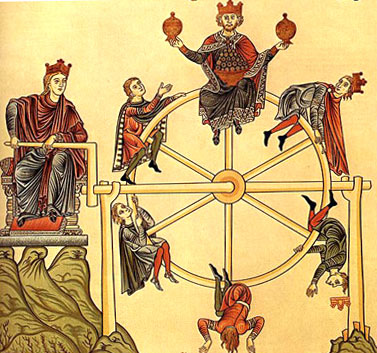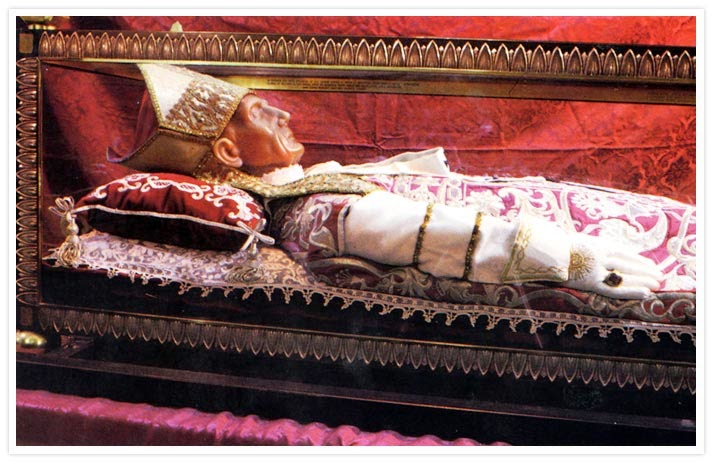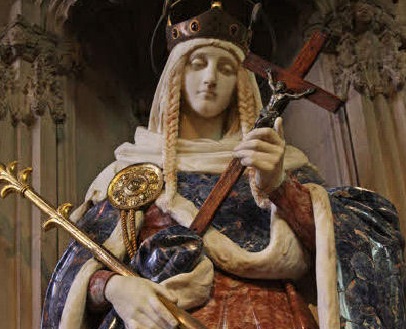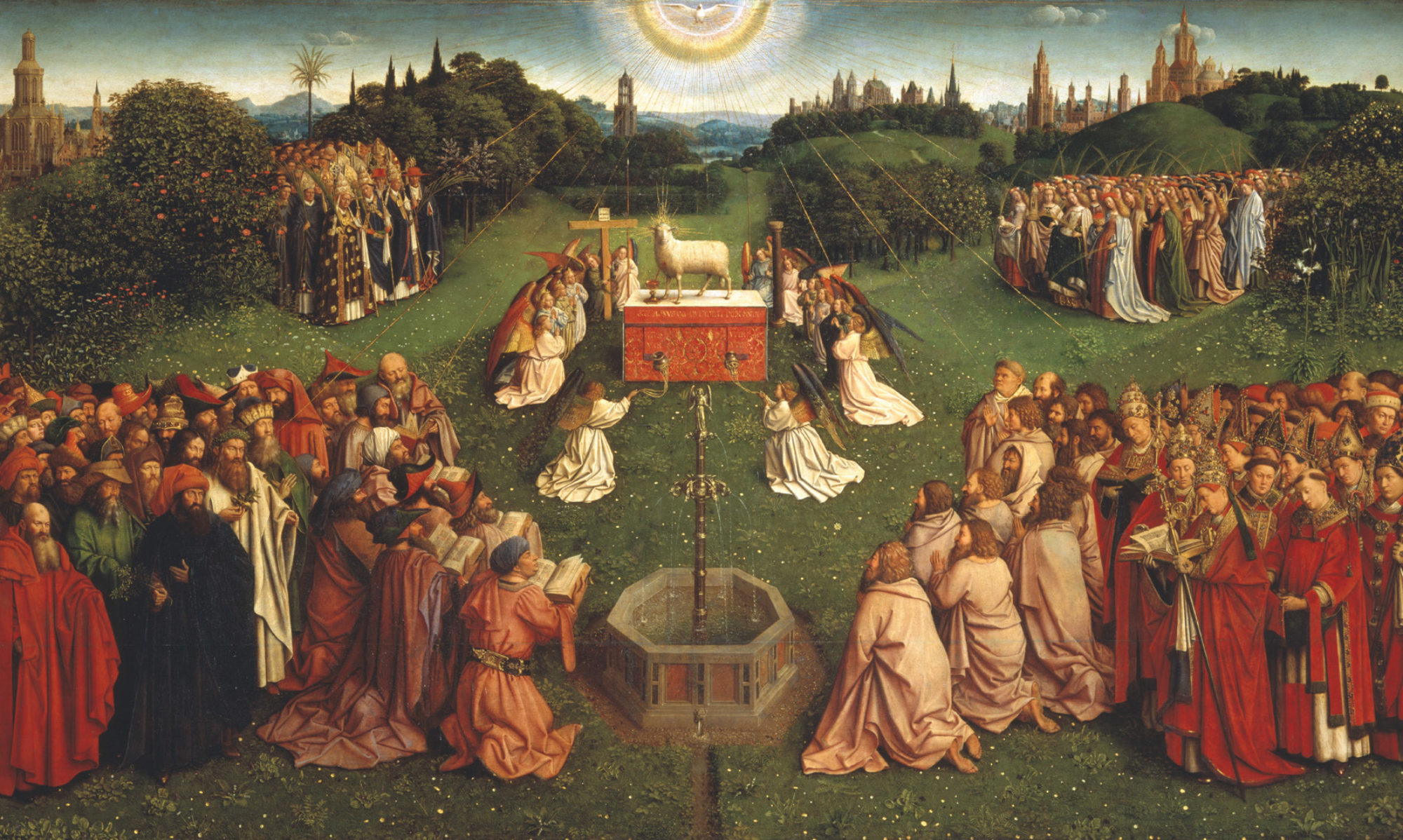While most Catholics are familiar with the concept of “state in life” to describe whether one chooses the marriage or the consecrated life, there is also a corresponding idea of “station in life” that was traditionally used to explain differentiation of men into different social classes. The original medieval distinction recognized only three stations: “Those who work, those who pray, those who fight”, but by the high middle ages these distinctions would be subdivided into over two dozen distinct “stations in life”, each with their own social standing and corresponding obligations. But how did these diverse “social standings” interact with the Gospel’s universal call to humility? Let us look into this question and see how men of high station in life still exercised humility, and how this was quite different from modern concepts of what a humility looks like.
Until the advent of the democratic age, it was taken for granted that men found themselves in different stations in life, some better and some worse. Whereas modern sociologists fret a great deal about why people find themselves in particular social classes, this sort of question did not trouble the medievals; how a man arrived at his station was not as important as whether or not he lived up to his station. The providence that placed men in different stations was exemplified in the Middle Ages by the “Wheel of Fortune”, which was an artistic way of depicting the apparent mystery of why some are born poor and some rich, a mystery that was only resolved in God’s providence and which medieval man was content to marvel at. This side of heaven, the best one could do was to accept one’s station in life, whatever it was, and attempt to live up to the demands of that station.

This view was necessarily hierarchical, as it accepted differences in social standing as a fundamental part of the order of the world. The poor were with us always, and while many Christians, motivated by charity, sought to alleviate the suffering of the individual poor, little thought was taken towards ameliorating poverty itself. Because the worldview was hierarchical, it was understood that different standards of behavior were applied to individuals differently depending upon their social standing. What was appropriate for a peasant might not be appropriate for a noble, and vice versa. This dual standard applied not only to social mores, but even to law, as in most places peasants, nobles, clergy, townsmen and knights were under different legal codes. The medievals did not believe in an absolute “equality before the law”; following the ancients, they instead went by the dictum “Equality among equals, inequality among unequals”, which harkened back to Aristotle. (1) Society was fundamentally unequal, but it was ordered, and this was simply part of the natural way of things.
Following the ancients, the medievals believed that, while the reasons one occupied a certain station in life were unknown, the fact that we found ourselves in a certain station was a sacred trust. Men had an obligation to humbly accept their station in life as the will of God, in such a way that abandoning our station and its responsibilities was seen as an offense against God’s providence, which orders all things. The view was common among the ancient Greeks, and we have these memorable lines from Plato’s Phaedo in which Socrates reflects on the general immorality of suicide as an attempt to escape the decrees of fate:
SOCRATES: if one of your own possessions, an ox or an ass, for example took the liberty of putting himself out of the way when you had given no intimation of your wish that he should die, would you not be angry with him, and would you not punish him if you could?
CEBES: Certainly.
SOCRATES: Then there may be reason in saying that a man should wait, and not take his own life until God summons him, as he is now summoning me. (2)
Imperfect though their thinking was, the Greeks understood that, generally speaking, it is not right for a man to attempt to prematurely get out of his responsibilities by taking his own life, or by any other means, for that matter. This view was further refined in the Middle Ages, so that one’s station in life and the attendant responsibilities were not the decrees of a blind fate but of a loving God who had a distinct plan for every person, a plan which people cooperated with by living up to the station that God had called them. Thus, humbly accepting one’s station in life became a way of cooperating with divine love and was part of the harmony of the cosmos. Yet the medievals still maintained the ethic that to deviate from one’s obligations or to try to escape them by feigning a lower status was objectively wrong. This is why in Dante’s Divine Comedy, Pope St. Celestine V, who resigned the papacy in 1296, is not found among the blessed, but is actually placed in hell by the poet for refusing to carry the obligations God had placed on him:
“And when I’d noted here and there a shade
Whose face I knew, I saw and recognize
The coward spirit of the man who madeThe great refusal, and that proof sufficed;
Here was that rabble, here without a doubt
Whom God and whom His enemies despised“(3)

Later, when speaking with Pope Boniface VIII in the eighth circle of hell, that pope refers to the keys of the kingdom entrusted to the papacy that were despised by the resignation of Celestine V, “The gates of Heaven, for those high keys are twain, the keys my predecessor cherished not” (4). Of course, Pope Celestine V is not in hell; in fact, he was canonized in 1313, presumably after Dante penned these lines. But the point is this: in the classical tradition, it is taken for granted that the world is an unequal place, full of poor and wealthy who live together along the course of this earthly pilgrimage. This order, though its reasons are inscrutable to man’s designs and can sometimes appear random (hence the Wheel of Fortune), is nevertheless from God. The world is a hierarchy that mirrors the divine hierarchy, and to try to subvert this hierarchy or for a man to try to escape the burdens of his station in life was considered unethical, sometimes positively sinful. The best thing a man could do was live up to his station in life faithfully. Whether one was peasant or pope, the thing to do was to seek out the ideal of what the best peasant or pope looked like and then try to attain that ideal by God’s grace.
So we have an unequal world. Fine and good. But the problem is that the Gospel calls all men to practice humility, both rich and poor, slave and free, Jew and Greek, king and servant. This means that, while all are called to practice the virtue of humility universally, the way this practice will look will vary depending on the station and circumstances of each man practicing it. Because humility is a virtue, it is also a habit, a fundamental disposition of the soul. Insofar as it is a habit of the soul, all men are called to practice it. But, habits are formed and sustained by concrete acts, which both express virtue and confirm it in the soul of the agent. Thus, humility also will be expressed by outward acts. So, as with any virtue, we have two sides to humility: its interior act and its external act.
Returning to our observations on station in life, this means that while all men are called to be interiorly humble, the external acts of humility will look different for men in different stations in life. Furthermore, there are certain acts of humility that are proper for certain stations in life, and certain acts that are not proper. Any action that expresses or reinforces the virtue of humility is praiseworthy, but only insofar as it does not consist in denying or derogating from one’s station in life and the duties attendant upon that station.
In the early 18th century, a priest named Fr. Cajetan Mary de Bergamo (d. 1753) wrote a treatise entitled Humility of Heart, which was popularized by the English Cardinal Vaughn in his 1903 translation and has subsequently become a classic on the virtue. In his treatise, Bergamo insists on the universal practice of humility, but notes that the way humility looks externally will vary depending on one’s station in life. He says:
“Humility of heart…has no limits, because before God we can always abase ourselves more and more, even unto utter nothingness, and we can do the same to our fellow men; but in the exercise of these exterior acts of humility, it is necessary to be directed with discretion, in order not to fall into an extravagance that might seem excessive…
Profound humility should exist in every state of life, but exterior acts of humility are not expedient to all. For this reason Holy Writ says, “Beware that thou be not deceived into folly, and be humbled” (Ecclus 13:10).
To practice humility of heart in the midst of pomp and honors, we can learn from the pious Esther, how she cried to God, “Thou knowest my necessity, how I abominate the sign of my pride” (Est. 14:16). I attire myself in this rich apparel and with these jewels because my position demands it; but Thou, Lord, seest my heart, that through Thy grace I am not attached to these things, nor this apparel, and that I only wear them of necessity. Here indeed is a great example of that true inward humility which can be practiced and felt amid external grandeur.” (5)
Note the distinction between the interior “humility before God” and the external act of humility. While both have a place in the spiritual life, it has been a constant theme in Christian tradition, from our Lord speaking about the Pharisee and the Tax Collector right up until relatively recently, that the interior humility before God is what is absolutely necessary and takes precedence over external acts of humility, which can lead to extravagance and may be imprudent depending upon one’s station in life. While we all can “abase ourselves before God”, it is not expedient for everyone to practice external acts of humility. A queen does not become humble by dispensing with the pomp and honors that signify her office, but by remaining interiorly humble and detached despite the pomp and honors.

The virtue of humility, according to St. Thomas, is the proper disposition of a creature towards its creator and is part of the broader virtue of temperance. Whereas temperance moderates our use of created things, humility moderates the opinions we have with regards to ourselves; it serves “to temper and restrain the mind, lest it tend to high things immoderately.”(6) It is not a false self-abasement, but a sober, reasonable assessment of our own weaknesses and strengths that keeps our pride in check. Thus, it is not humility, for example, to deny that one possesses a certain gift or responsibility; it is humility, however, to hold in check our tendency to inflate our own importance because of that gift.
Like Bergamo, Aquinas insists on humility “before God” as much more important than outward acts of humility, which can easily become false humility and themselves signs of pride. Aquinas says:
“Humility…conveys the notion of a praiseworthy self-abasement to the lowest place. Now this is sometimes done merely as to outward signs and pretense: wherefore this is “false humility,” of which Augustine says in a letter (Ep. cxlix) that it is “grievous pride,” since to wit, it would seem to aim at excellence of glory. Sometimes, however, this is done by an inward movement of the soul, and in this way, properly speaking, humility is reckoned a virtue, because virtue does not consist in externals, but chiefly in the inward choice of the mind” (7).
Outward signs of humility are not bad, but can become so when done “merely as outward signs”; i.e., when the sign does not correspond with an interior disposition, when it is done through selfish motives, or, Aquinas adds, when it causes harm or scandal to others:
“Due moderation must be observed in the outward acts of humility even as of other virtues, lest they conduce to the detriment of others” (8).
How can outward acts of humility conduce to the detriment of others? St. Thomas is specifically thinking of situations in which external acts of humility undermine a person’s station in life, in such a way that they either disgrace the office they hold or do harm to those under one’s patronage. It may be a humble act to give away one’s own wealth, but it is not humble to give away the wealth of others, or to give away the things entrusted to your safekeeping by others, or to deprecate the signs of one’s office in misguided attempts at humility. This is why when St. Francis gave his possessions away it was an act of genuine humility, but when he gave away all his father’s fabrics it was considered an act of immature and imprudent zeal.
What do the external acts of humility look like in different stations in life? In the poor and those whose station is generally considered to be lower, humility is expressed in outward acts of deference. This applies across the board: for lay people, it consists of putting others before our self, doing our jobs without complaint, seeking to anticipate the will of our boss, spouse, etc. In religious life, this deference takes the form of evangelical obedience to superiors; in the ecclesiastical hierarchy, this deference is expressed in certain honorific titles and gestures (kissing the ring of a prelate, for example). If we are in a lower station than somebody else, we use acts of deference to express humility before that person as a sign of our humility before God.
This is generally agreed upon. But the real question is what does humility look like in a person of high station? How does a prince, pope or president express outward acts of humility in keeping with his station in life? Knowing that external acts of humility at this level can sometimes be imprudent if they undermine one’s station, how does a person of high station manifest humility without falling into the danger St. Thomas mentions?
While a person of lower station demonstrates external humility by acts of deference, a person of higher station expresses external humility by acts of magnanimity, which is the quality of having a great soul. Because someone of an extremely high station in life has no earthly superior before whom they can abase themselves, they express humility by using the power and influence their office brings them to bless and assist other individuals, especially when they have no strict obligation to do so. Magnanimity leads those of great station to have a fatherly concern for those below them, for whom they feel a particular care, and consequently they take delight in using their office to become a blessing to others.

Thus, St. Oswin, an early medieval English king, demonstrated humility once by giving his royal horse away to a poor man. The medieval kings of France and England used to entertain the poor in their royal halls once per year and send them all away with a special gold coin minted just for the occasion. Bishops wash the feet of their priests. St. Elizabeth of Hungary used her personal finances to purchase food for the poor, and St. John the Apostle went off on horseback to personally bring back a young believer who had strayed in his faith. Pope Julius II used his wealth to finance beautiful works of art at the Vatican, and St. Margaret of Scotland funded a ferry to take pilgrims across the Firth of Forth to Dunfermline Abbey. Alfred of England and St. Louis IX of France wore simple clothes and hair shirts under their royal garments; Louis IX also ate plain meals. Henry II of the Holy Roman Empire, despite his splendor, lived celibate and chanted the Divine Office alongside the Benedictines as an oblate. The great Charlemagne also, though accustomed to being obeyed an honored as Emperor, when at prayer said the Divine Office humbly beside the Benedictines as a brother, not a monarch.
These acts alone do not make one humble, but taken with the proper interior dispositions, each in their own way persons of rank can express magnanimity; magnanimous acts are what expressions of humility look like in persons of high station. But note that none of these expressions of humility undermine or detract from the station or office held by the individual. St. Oswin gave a poor man his horse, but he would not have given him his crown. The English and French kings allowed the poor to dine in the royal hall, but they did not let them sit on the royal throne. Bishops wash the feet of their priests, but at the end of the day, the priests still must obey and answer to the bishop. Julius II used his wealth to beautify the Church; he did not dispense with the beauty of the Church to feed the poor. Alfred and Louis wore hair shirts beneath their royal clothes, but St. Louis also said that “people ought to clothe themselves in such a way that men of riper age would never say that they had spent to much on dress, or young men say that they had spent too little” (9). He also defended the proposition that the king should always be the best dressed person in the room (10). Elizabeth used her own personal property to fund relief efforts among the poor, but she did not sell her crown and scepter. Charlemagne and other kings might say the Divine Office alongside the Benedictines as brothers, but they did not take policy suggestions from Benedictines as equals.
In short, acts of humility by individuals of high station must never diminish their office, for the fundamental reason that one in a high office does not hold that office for himself, but on behalf of others, on behalf of those whom he serves. If a king admits the poor to his chambers and gives them money, he is praised as humble; if he admits the poor to his chambers, takes them as counselors and lets them sit on his throne, he acts with imprudence and actually weakens his office by making the throne a thing of contempt. A pope who spends his own private fortune to relieve the poor and suffering, as Pius XII did during World War II, exercises humility and magnanimity because he his putting himself at the service of those whom he has some sort of care over; but a pope who thinks to help the poor or demonstrate humility by abandoning the signs of his office or refusing to govern with authority brings the papacy into contempt and weakens future pontiffs by inadvertently giving away his own power in a gesture of false humility. A bishop is praised as humble if he works alongside his priests and bears their burdens equally; but if a bishop lets his priests do what they will without supervision or correction, he is as guilty failing in his office, even as Eli was guilty for not disciplining his sons (1 Sam. 2), another example of humility gone wrong. These are the sorts of gestures, according to St. Thomas, that “conduce to the detriment of others”, because they go beyond one man’s humility and weaken an entire institution, thereby causing those under it to suffer.
This principle is especially important with regards to the clergy and the exterior symbols of divine worship. While the Council of Trent rigorously went about reforming the life and morals of the clergy, it took care to explain that the interior humility and spirit of detachment required of the clergy did not translate into minimalism in the liturgy. Session XXII famously explained:
“And whereas such is the nature of man, that, without external helps, he cannot easily be raised to the meditation of divine things; therefore has holy Mother Church instituted certain rites, to wit that certain things be pronounced in the mass in a low, and others in a louder, tone. She has likewise employed ceremonies, such as mystic benedictions, lights, incense, vestments, and many other things of this kind, derived from an apostolical discipline and tradition, whereby both the majesty of so great a sacrifice might be recommended, and the minds of the faithful be excited, by those visible signs of religion and piety, to the contemplation of those most sublime things which are hidden in this sacrifice” (11).
Just as the signs of royal authority (crown, scepter, throne) serve as external aids to remind man of the king’s royal authority (and as such they cannot be discarded without weakening the authority they represent), so the vestments and rites of the liturgy serve as external helps to raise man’s mind toward contemplation of heavenly things. Therefore, it would not be proper for a bishop or pontiff or priest to discard or minimize these elements of the liturgy for the sake of humility or simplicity; such would not be a true humility, but an excessive, imprudent act of false-humility “conducive to the detriment of others.”
The reason this is so is simple: it is humility for a man to abase himself, but not his office; it is magnanimous for a man to give away what belongs to himself, but not what pertains to his office or that which he holds in trust for the people or his successors. When one crosses this line, the external act is no longer one of humility but one of recklessness.

St. Francis of Assisi, who is commonly reckoned among the most humble men who ever lived, understood this distinction and knew that the liturgical rites and vestments of the Church are not the private property of any priest or bishop but are the patrimony of the entire Church and belong properly to God. This is why, despite the great poverty of the Friars Minor, he insisted on excellence and splendor in divine worship:
“I beg you more than if it were a question of myself that, when it is becoming and you will deem it convenient, you humbly beseech the clerics to venerate above all the most holy Body and Blood of our Lord Jesus Christ and His Holy Name and written words which sanctify the body. They ought to hold the chalices, corporals, ornaments of the altar, and all that pertain to the Sacrifice as precious. And if the most holy Body of the Lord is left very poorly in any place, let It be moved by them to a precious place, according to the command of the Church and let It be carried with great veneration and administered to others with discretion. The Names also and written words of the Lord, In whatever unclean place they may be found, let them be collected, and then they must be put in a proper place. And in every time you preach, admonish the people about penance and that no one can be saved except he that receives the most holy Body and Blood of the Lord. And whenever It is being sacrificed by the priest on the altar and It is being carried to any place, let all the people give praise, honor, and glory to the Lord God Living and True on their bended knees. And let His praise be announced and preached to all peoples so that at every hour and when the bells are rung praise and thanks shall always be given to the Almighty God by all the people through the whole earth” (12).
Francis clearly did not believe that interior humility before God one required one to dispense with all of the signs and gestures of reverence inherent in the liturgy. Such a thing would have been abhorrent to the Poor Man of Assisi, who knew that there was no cleavage between true, simple humility and grandeur in divine worship.
Why is this so misunderstood in the modern world? Why is the simple distinction that was understood by the medievals and even the pagan Greeks so difficult for moderns to grasp? The answer is that the modern man cannot understand these things because the concept of a hierarchically ordered society in which every man has his proper state and station in life has been replaced by a vulgar egalitarianism in which all men are basically presumed to be equal in every sense. Thus, with no concept of “station in life”, there can certainly be no concept of differing acts of humility that correspond to these different stations.
A society that cannot understand the classical teaching of stations in life can only grasp the corresponding concept of “signs of office” with great difficulty. When stations in life and signs of office disappear, all we are left with is the naked individual, his whims, his likes, his dislikes, and the office can be made or unmade according to the fancy of the office-holder. It becomes ultimately about the person, and all signs of the office (vestments, titles, rites, etc.) become the personal property of the office holder, to keep or discard as he sees fit. Instead of true acts of humility corresponding with one’s station in life, we see the powerful trying to act humble by debasing their office, denying the authority that is rightfully theirs, throwing away the signs of office, the titles, and anything smacking of hierarchy for the sake of pandering to a false egalitarianism. And as true humility perfects the soul of the agent and edifies others, so this false-humility harms the soul of the agent and causes much mischief in the organization or body over which this misguided individual presides, which is sadly too common in our day and in our Church.
Such is the poverty of the age we live in.
(1) Aristotle, Politics, Book III. The original dictum as found in Aristotle is “Justice is equality, but only for equals; and justice is inequality, but only for those who are unequal.
(2) Plato, Phaedo, 61-62c
(3) Dante Alghieri, Inferno, Canto III, 58-61
(4) ibid., Canto XXVII, 103-105
(5) Fr. Carjetan Mary da Bergamo, Humility of Heart, trans. Herbert Cardinal Vaughn (Rockford, Ill: Tan Books, 2006), 107-108
(6) St. Thomas Aquinas, STh, II-II, Q.161 art. 1
(7) ibid.
(8) ibid., art. 3
(9) Joinville, “Life of Saint Louis” in Joinville and Villahardouin: Chronicles of the Crusades, ed. M.R.B. Shaw (New York: Penguin Books, 1963), 168
(10) ibid., 171
(11) Council of Trent, Session XXII, Chapter V, “On the solemn ceremonies of the Sacrifice of the Mass.”
(12) St. Francis of Assisi, Epistola ad Custodes
Phillip Campbell, “Humility and Station in Life,” Unam Sanctam Catholicam, March 16, 2013. Available online at http://unamsanctamcatholicam.com/2022/06/06/humility-and-station-in-life/

